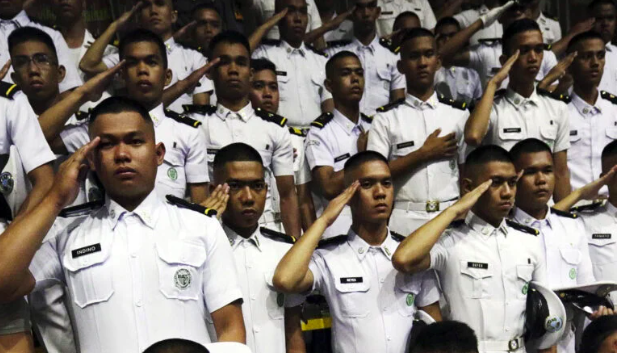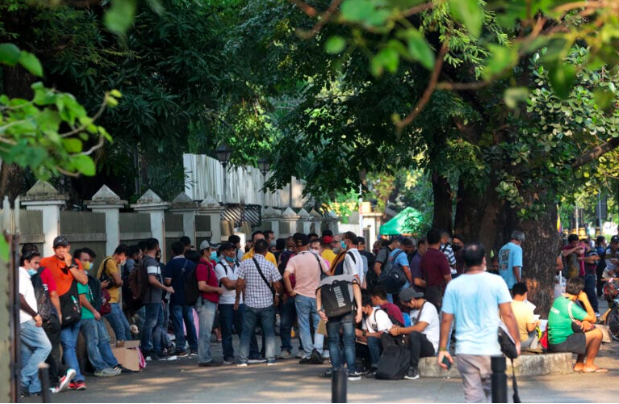PH seafarers get to keep jobs; EU cites ‘progress’

AIMING TO WORLD CLASS | Migrant Workers Secretary Susan Ople says the government is taking steps to raise the quality of Filipino seafarers up to international standards, including ramping up investments for simulators and other training equipment to make them world-class. The hundreds of thousands of Filipinos working on various types of vessels overseas remitted $6.71 billion last year, a major contribution to the country’s foreign earnings. (File photo by MARIANNE BERMUDEZ / Philippine Daily Inquirer)
MANILA, Philippines — “Crisis averted!”
That was how Malacañang on Saturday described the European Union’s decision to extend its recognition of the Philippines seafarer’s certificate, saving the jobs of some 50,000 Filipinos working on EU-flagged ships.
In a March 31 letter to the Maritime Industry Authority (Marina), Director General Henrik Hololei of the Directorate General for Mobility and Transport of the European Commission (EC) told the Maritime Industry Authority (Marina) that the Philippines had shown “concrete progress and improvement” in complying with the requirements of the International Convention on Standards of Training, Certification and Watchkeeping for Seafarers (STCW).
“The outcome of the analysis allows the EU to extend the recognition of the Republic of Philippines STCW system. Nevertheless, the services of the European Commission consider that there are still issues to be addressed,” Hololei said in his letter, as quoted by Press Secretary Cheloy Velicaria-Garafil on Saturday.
Deficiencies
The European Union last year cited deficiencies in the country’s seafarer training and education, warning the government that Filipinos could be denied deployment due to a lack of European Maritime Safety Agency (Emsa)-certified licenses.
The Philippines has failed to pass the Emsa compliance with the 1978 STCW since 2006.
A 2020 Emsa audit found 23 discrepancies, including the lack of facilities, equipment and simulators for training seafarers as well as the absence of procedures for students who have completed their onboard training in the different maritime higher education institutions.
According to Samuel Batalla, officer in charge for the office of the Marina executive director, Marina and the Commission on Higher Education (CHEd) were working to update the curricula for the bachelors of science on marine transportation and on marine engineering as well as training programs that would comply with the STCW.
Last November, President Ferdinand Marcos Jr. ordered several government agencies to ensure that the country’s training program and accreditation system for seafarers would pass EU standards.
The following month, Marcos assured EU transport officials that the government was working to address certification issues.
He also ordered the creation of an advisory board to address not only possible job losses for about 50,000 Filipinos in EU-flagged vessels but to also address the concerns of about 600,000 seafarers worldwide.
Marcos told reporters during his December trip to Belgium that his administration would “do everything we can” to comply with the STCW.
“It’s not something you can debate about. You comply. We’ll have to comply. So that we will be accredited. And this is our last chance so we have to really — we really have to get it done,” he said.
The 2021 maritime transport report of the United Nations Conference on Trade and Development showed that the Philippines was the top provider of seafarers globally, followed by Indonesia, China, and India.
In a speech at the Maritime Industry Summit on Feb. 28, the president reported that Filipino seafarers remitted $6.71 billion in 2022, up 2.6 percent from $6.54 billion in 2021, which was 3 percent more than the $6.353 billion sent home in 2020.

Hundreds apply daily at various manning agencies to board ships in hopes of giving a better life to their families. (File photo by GRIG C.MONTEGRANDE / Philippine Daily Inquirer)
‘Confidence’ builders
Migrant Workers Secretary Susan Ople told reporters on Saturday that various efforts by the government to raise the quality of Filipino seafarers gave the EC the “confidence” that the Philippines could reach international standards.
One step taken was to ramp up investments for training of seafarers to cope with new environment-friendly technologies, she said.
The investments also included those for simulators and other training equipment that would make Filipino seafarers, especially those in managerial positions, world class.
Ople added that decarbonization technology was one of the new areas the government wanted to focus the training on as it was becoming a global standard.
CHEd moratorium
EC Commissioner for Transport Adina Vălean said the Philippines could count on their technical support to improve the implementation and oversight of minimum education, training and certification requirements for Filipino seafarers as well as their living and working conditions.
Ople pointed out that the moratorium imposed by CHEd on accrediting new maritime schools also showed the EC the country’s “sincerity” in improving the curriculum and training standards of existing maritime schools.
She said that what really showed the government’s commitment to comply with international standards was the approval of the Magna Carta for Seafarers Bill. House Bill No. 7325 seeks to improve the training of seafarers and provide assistance prior to, during and after deployment, especially with respect to maritime accidents.
“It secures and boosts the confidence of foreign shipowners that the international standards for international seafarers will now be reflected in our laws, without prejudice to the rights and welfare of our seafarers,” Ople said.
The International Maritime Employers’ Council, an organization of more than 250,000 shipowners worldwide also recognized the government’s “commitment to the highest level in protecting seafarers”
Ople noted that in 2019, there were 505,753 deployed seafarers. This number fell to 270,000 in 2020 during the pandemic. As border restrictions eased in 2022, it jumped to 489,000.She said she was confident that the figure will grow bigger with the EC’s continued recognition of Filipino seafarers’ certificates and the enactment of the Magna Carta for Seafarers.
Sen. Risa Hontiveros said she will push for the passage of the seafarers’ bill as she thanked the government’s interagency task force whose work brought “relief” to Filipino seafarers.
She and Sen. Grace Poe and Senate Majority Leader Joel Villanueva urged the government to step up seafarers’ skills training and to continue industrywide reforms.
The government must now act on the seafarers’ concerns, such as exorbitant fees and other “unreasonable” requirements, and alleged corruption in training and maritime schools, Hontiveros said.
She also pressed CHEd to remedy “deficiencies” in the maritime education system.
Make the most of reprieve
Poe, chair of the Senate committee on public services, called on the government and private sector to “step up efforts” to use the period allowed by the European Union to boost training and seriously heed the issues raised by Emsa.
According to Poe, the quality of the country’s maritime education will ensure the safety of travelers and secure the future of many Filipino seafarers’ families.
Rep. Ron Salo, chair of the House overseas workers affairs committee, was also thankful for the European Union’s continued recognition of the Filipino seafarers’ certificate.
“It is hoped that this recognition will lead to more opportunities for Filipino seafarers and help improve their working conditions and benefits,” he said in a statement on Saturday.
—WITH REPORTS FROM MELVIN GASCON, JULIE M. AURELIO AND INQUIRER RESEARCH
RELATED STORIES
European Council chief backs PH moves to tackle seafarers’ issues
Marcos promise: PH will comply with EU standards for seafarers
Japan firms pledge investments, hiring of more PH seafarers
Disclaimer: The comments uploaded on this site do not necessarily represent or reflect the views of management and owner of Cebudailynews. We reserve the right to exclude comments that we deem to be inconsistent with our editorial standards.
